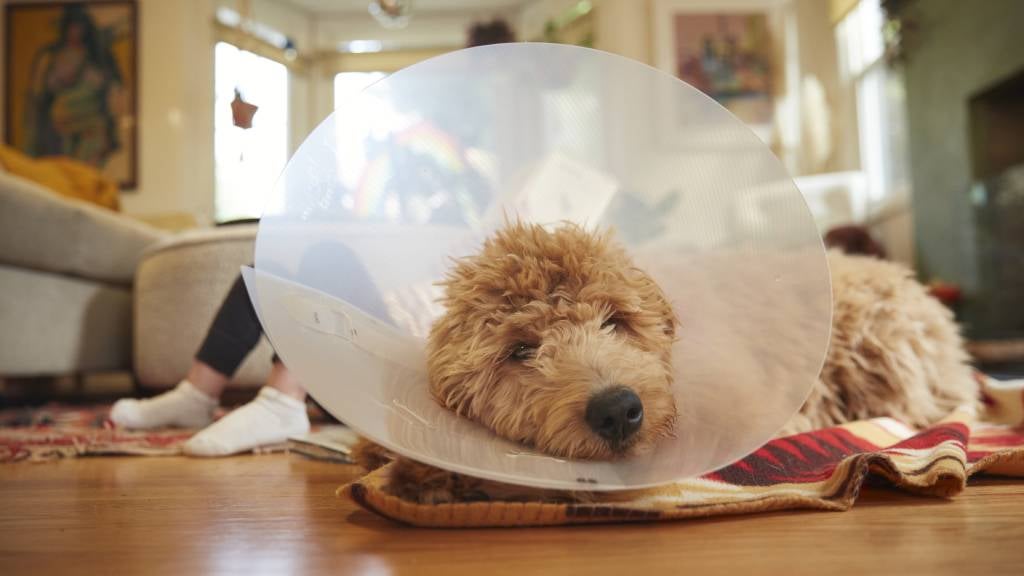Why should you desex your dog?

Desexing your dog is more than just a responsible choice; it's a step toward building a healthier pet population. In Aotearoa, the number of dogs and puppies needing SPCA’s help is increasing. Many of these pups are the result of unplanned litters, leading to an ever-increasing need for animals needing forever homes.
By choosing to desex your puppy or dog, you're helping to reduce this statistic and promote a range of health benefits for your dog. From reducing the risk of certain cancers to curbing unwanted behaviours, desexing can lead to a healthier life for you and your pet. Dr Rosalind Holland (BVSc, MVM, MANZCVS) helps to unpack these benefits, as well as outlining some key considerations.
Why should you desex your dog?
Desexing your dog is not mandatory across New Zealand, but it's highly recommended. Within certain councils, your dog may be required to be desexed if they are classified as menacing or dangerous. With dog overpopulation being a significant issue, it's crucial to reduce the number of unplanned litters and unwanted puppies so that all dogs have the chance to find loving homes.
Optimal timing and considerations
Timing plays a significant role in the desexing process, which is why owners often question when the best time is to schedule the procedure. Dogs are generally desexed around 4-6 months. Desexing can be safely carried out at a young age and is typically a faster procedure with a quicker recovery time. However, the decision around timing should be made on a case-by-case basis guided by your vet. There is an ongoing discussion about specifics such as pre or post-pubertal desexing and the differing needs between breeds.*
According to Dr Holland, "the optimal timing for desexing will depend on many individual factors for your pet," she advises, "Factors such as size, breed, sex, behaviour, lifestyle, body condition, and known familial illnesses will all impact the optimal time and procedure for your pet."
Discussing these factors with your veterinarian is crucial. They can provide personalised recommendations that consider your dog's unique needs, ensuring the best outcome for their health and well-being.
Benefits of desexing
Health benefits
One of the most significant health benefits of desexing is its role in cancer prevention. Dr Holland emphasises that "desexing can have protective effects against some types of cancer, most obviously cancers of the ovaries and testicles, but also against mammary cancers in female dogs."
Having your female dog desexed can also prevent pyometra, a potentially fatal infection of the uterus in non-desexed females It also removes the risk of phantom pregnancies.
Behavioural benefits
Desexing can also lead to noticeable behavioural improvements. For instance, reducing aggressive behaviours toward other male dogs. This won’t lead to any great character changes, but your dog may be quieter and more placid.
In males, it may reduce roaming, and hormonally-driven behaviours like urine marking and mounting.
Other benefits
Beyond health and behaviour, desexing offers various practical benefits.
In New Zealand, desexing your dog can lower registration fees, with most councils offering a lower registration fee for desexed dogs.
For those with female dogs, desexing can also prevent unwanted pregnancies and the responsibilities and added costs that come with it, such as providing vet care, finding homes for puppies or dealing with complications during birth.
Managing a female dog in heat further creates additional challenges as she will often show behaviour changes, including becoming clingy, anxious or restless. It can also be challenging to handle the cleaning of vaginal discharge or bleeding that can last for 2-3 weeks, or avoid the attention of male dogs. Many councils also don’t allow dogs in heat at dog parks, so alternative confined spaces will be required to ensure exercise needs are met.
When it comes to boarding kennels and doggy daycares, being desexed can make things a whole lot simpler. Many boarding facilities only accept desexed adult dogs because they are less likely to cause disruption in a group setting. Often even the boarding facilities that do allow intact dogs will not accept females in heat.
A smart move for happier, healthier pets
Desexing is a responsible choice for dog owners that offers numerous benefits, from reducing reproductive infections and cancer risks to improving some behaviours.
Remember, desexing is not mandatory in New Zealand, but it remains important to promote responsible pet ownership for both dogs and cats, ensuring your pet's well-being. For more information or to discuss your options, reach out to your local vet clinic or SPCA Centre for guidance.
While considering the health and well-being of your pet, now is the perfect time to re-evaluate your pet insurance. While SPCA Pet Insurance does not cover desexing, you can choose from three different levels of cover depending on your needs and budget, that will help reduce the heat of eligible vet bills.
Visit our website to find the right coverage for your furry friend, or get a quote online today.
*Note: The SPCA supports and recommends pre-pubertal desexing under veterinarian guidance. As of July 2024, WSAVA (The World Small Animal Veterinary Association) released new desexing guidelines in which optimal desexing time is decided on a case-by-case basis.
6 Nov 2024
